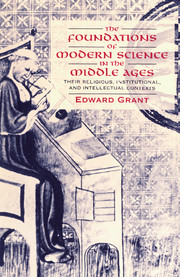 The Foundations of Modern Science in the Middle Ages
The Foundations of Modern Science in the Middle Ages Book contents
- Frontmatter
- Contents
- Preface
- 1 THE ROMAN EMPIRE AND THE FIRST SIX CENTURIES OF CHRISTIANITY
- 2 THE NEW BEGINNING: THE AGE OF TRANSLATION IN THE TWELFTH AND THIRTEENTH CENTURIES
- 3 THE MEDIEVAL UNIVERSITY
- 4 WHAT THE MIDDLE AGES INHERITED FROM ARISTOTLE
- 5 THE RECEPTION AND IMPACT OF ARISTOTELIAN LEARNING AND THE REACTION OF THE CHURCH AND ITS THEOLOGIANS
- 6 WHAT THE MIDDLE AGES DID WITH ITS ARISTOTELIAN LEGACY
- 7 MEDIEVAL NATURAL PHILOSOPHY, ARISTOTELIANS, AND ARISTOTELIANISM
- 8 HOW THE FOUNDATIONS OF EARLY MODERN SCIENCE WERE LAID IN THE MIDDLE AGES
- Notes
- Bibliography
- Index
8 - HOW THE FOUNDATIONS OF EARLY MODERN SCIENCE WERE LAID IN THE MIDDLE AGES
Published online by Cambridge University Press: 05 June 2012
- Frontmatter
- Contents
- Preface
- 1 THE ROMAN EMPIRE AND THE FIRST SIX CENTURIES OF CHRISTIANITY
- 2 THE NEW BEGINNING: THE AGE OF TRANSLATION IN THE TWELFTH AND THIRTEENTH CENTURIES
- 3 THE MEDIEVAL UNIVERSITY
- 4 WHAT THE MIDDLE AGES INHERITED FROM ARISTOTLE
- 5 THE RECEPTION AND IMPACT OF ARISTOTELIAN LEARNING AND THE REACTION OF THE CHURCH AND ITS THEOLOGIANS
- 6 WHAT THE MIDDLE AGES DID WITH ITS ARISTOTELIAN LEGACY
- 7 MEDIEVAL NATURAL PHILOSOPHY, ARISTOTELIANS, AND ARISTOTELIANISM
- 8 HOW THE FOUNDATIONS OF EARLY MODERN SCIENCE WERE LAID IN THE MIDDLE AGES
- Notes
- Bibliography
- Index
Summary
Although science has a long history with roots in ancient Egypt and Mesopotamia, it is indisputable that modern science emerged in the seventeenth century in Western Europe and nowhere else. The reasons for this momentous occurrence must, therefore, be sought in some unique set of circumstances that differentiate Western society from other contemporary and earlier civilizations. The establishment of science as a basic enterprise within a society depends on more than expertise in technical scientific subjects, experiments, and disciplined observations. After all, science can be found in many early societies. In Islam, until approximately 1500, mathematics, astronomy, geometric optics, and medicine were more highly developed than in the West. Indeed, the West learned these subjects from translations of Arabic treatises into Latin. But science was not institutionalized in Islamic society. Nor was it institutionalized in ancient and medieval China, despite significant achievements. Similar arguments apply to all other societies and civilizations. Science can be found in many of them, but it was institutionalized and perpetuated in none.
An impressive array of scholarship testifies that modern science emerged in Western Europe as a result of the Scientific Revolution, a phenomenon associated overwhelmingly with the seventeenth century. That same scholarship has proclaimed that the emergence of modern science in the seventeenth century owes little or nothing to the Middle Ages. Not only did medieval natural philosophy play little, if any, role in the advent of early modern science, so goes the argument, but it was the major obstacle to it.
- Type
- Chapter
- Information
- The Foundations of Modern Science in the Middle AgesTheir Religious, Institutional and Intellectual Contexts, pp. 168 - 206Publisher: Cambridge University PressPrint publication year: 1996
